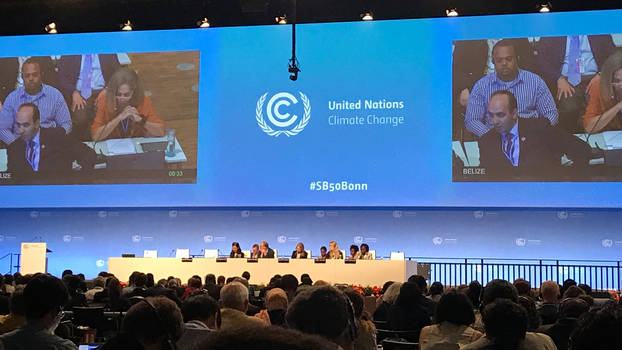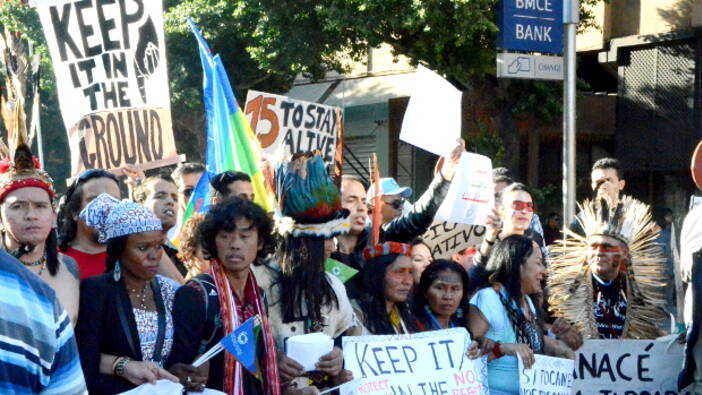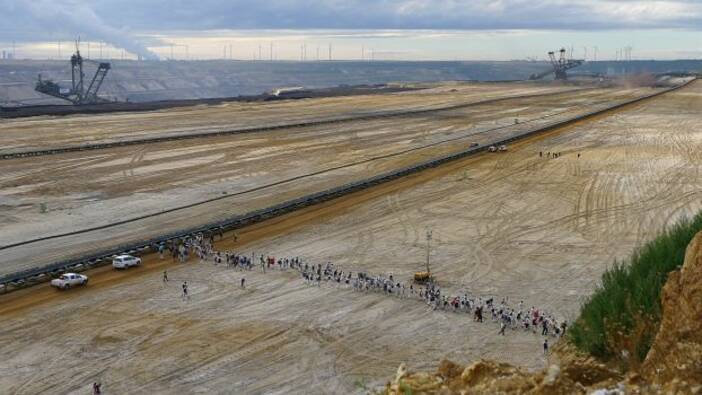
As Europe faced an intense heat wave, which saw temperatures soar to as high as 45 degrees, students, youth and other concerned citizens engaged in different forms of protest to highlight the need for climate justice. Fridays for Future – a youth-led movement started by 17-year old Swedish climate activist Greta Thunberg - organized a 40,000-strong march to Aachen, Germany that was participated by protesters from 17 countries, making it the first-ever international strike for climate. A day after, some 6,000 activists joined Ende Gelände, an act of non-violent civil disobedience that blocked the open-pit coal mines in Rhineland.
While these powerful demonstrations of the people’s frantic call for the survival of present and future generations were taking place, governments met in Bonn for the 50th session of the Subsidiary Bodies (SB50) under the United Nations Framework Convention on Climate Change (UNFCCC) to debate and decide on a number of unfinished items that deal with the implementation of the Paris Agreement. The agreement, adopted in 2015 and ratified by 185 Parties to date, commits governments to: (a) act to limit the temperature increase to 1.5 degrees Celsius, (b) increase the ability of countries to deal with the impacts of climate change, and (c) provide resources to enable a shift to climate-resilient pathways.
Two weeks of negotiations resulted in what may be termed as ‘willful ignorance’ - the intentional and blatant disregard of empirical evidence because they contradict one’s existing beliefs. If the outcomes of SB50 are to be investigated with a critical eye, it seems that climate denialism is gaining a foothold in the foremost platform of climate policymaking. Here are the highlights of the negotiations:
-
The Special Report on Global Warming of 1.5°C was published by the Intergovernmental Panel on Climate Change (IPCC) to ‘deliver the authoritative, scientific guide for governments’ to deal with climate change. It included over 6,000 scientific references, and was prepared by 91 authors from 40 countries and published after a long review process. In the end, parties still could not agree on how this report would guide the negotiations. Saudi Arabia and the United States, in particular, raised vehement objections on its findings and methodologies. Given the economic interests of both countries in the fossil fuel industry, particularly in oil, it is no wonder that the two heaviest polluters on Earth would sow doubts on the credibility and imperative of the IPCC report on 1.5 degrees. Simply put, the perpetuation of the power and stature of countries such as the US and Saudi Arabia is hinged on maintaining the status quo in the mode of production. Thus, discrediting science that supports what the people have known all along - that the system needs to be upended if people and planet are to survive the impending climate apocalypse – is the greatest weapon of these two countries in climate diplomacy.
-
Governments agreed at the 24th Conference of Parties last year in Katowice, to apply ‘common time frames’ for their nationally determined contributions (NDCs) to be implemented from 2030 onward. However, negotiators could not agree on what exactly the timeframe will be and even did not manage to come up with a concrete deadline by when they will do so. Despite the urgency to adopt national climate policies, this item has been abused as a way to renegotiate the Paris Agreement. This chosen path of ignorance is then additionally combined with a largely mitigation-centric NDC approach, with industrialized countries insisting that there be common timeframes to reduce greenhouse gases (GHG) emissions, in disregard of the UNFCCC principle of ‘common but differentiated responsibility, and respective capabilities’ (CBDR-RC). The burden of increasing the need for adaptation measures, especially for countries in the Global South, i. e. the ones that contributed least to the causes of climate change, remain a weak item in the negotiations.
-
Financing climate action has always been a thorny issue in the negotiations. The negotiations around finance were about: (a) coming up with a new long term finance goal from 2025 onwards; (b) replenishment of the Green Climate Fund by 2019; (c) aligning all financial flows with low carbon and climate resilient development. However, there is also an increasing push for the increased role of multilateral development banks in climate financing, as well as paving the way for more private sector, i.e. corporations, involvement through blended finance mechanisms which denote use of public finance to ‘leverage’ private investments in climate action.
-
Negotiators have repeatedly blocked demands of civil society and a few governments to have a ‘conflict of interest’ policy in the climate negotiations. The measure would have been a safeguard against undue influence of industries associated with the causes of climate change in the climate talks. As it stands, the UNFCCC has an “open arms policy” to fossil fuel industry representatives in the climate conference. Discussions around public participation have ironically focused on how to bring in private businesses that are regarded as ‘enablers’ of climate solutions.
-
There is an agreed ‘terms of reference’ (ToR) for the review of the Warsaw International Mechanism for Loss and Damage (WIM) associated with climate change impacts. Established in 2013 in Poland, the WIM was tasked to address impacts from extreme and slow onset events. Agreement on the ToR was reached only in the final hour of the negotiations, as industrialized countries made sure to reiterate that they will not be held liable to compensate communities for their losses and damages.
-
Governments were also in disagreement over long-term cooperative action on climate, with sharp divides over ‘market and non-market mechanisms.’ Industrialized countries pushed for flexibilities around market mechanisms, which would essentially mean resorting to carbon offsets and other false solutions. ‘Developing countries’ meanwhile wanted concrete non-market measures to cope with the impacts of climate change, as well as support for their transition to a low-carbon economy. Furthermore, there is uncertainty if the mechanism will implement safeguards to ensure human rights and sustainability.
But perhaps the most telling of this state of ‘wilful ignorance’ is the fact that the United Kingdom, Ireland, Canada and France have all declared ‘climate emergencies’ and stated their aim to reach carbon neutrality by 2050 but continue to support the fossil fuel industry with billions of dollars in subsidies domestically and abroad. Canada even approved of a pipeline expansion a day after declaring a national climate emergency. And let’s not forget, the European Union failed to agree on a decision to reach carbon neutrality by 2050 during a Brussels summit that coincided with the first week of the Bonn negotiations.
As the Bonn session wrapped up, United Nations Special Rapporteur on Extreme Poverty and Human Rights Philip Alston released a strong statement on the world being increasingly at risk of ‘climate apartheid’. Alston warned of a global situation where only the rich will be able to break away from heat and hunger caused by the escalating climate crisis, simply because they have the financial means to do so. The rest of the world without sufficient money will have to suffer.
In a month that saw hellish temperatures across Europe – a resounding affirmation of the climate crisis – world leaders continued to spew hot air in their commitments to climate action. In December, parties will celebrate the 25th anniversary of climate negotiations in Santiago, Chile. This past round of negotiations in Bonn has shown the detachment of international climate diplomacy from the urgent need to respond to the climate emergency – which fuels the global social crisis. Climate change adds another layer to existing injustices and threatens human rights globally. It is rather unlikely that the Chilean COP presidency will bring the necessary reboot needed to tackle climate change, as it has openly endorsed the inclusion of the business sector at COP 25 and gleefully announced its neoliberal agenda in climate action.
This then presents a unique call to action to social movements and climate justice activists around the world to continue to put pressure on governments inside and outside the UNFCCC process. After all, no meaningful change had ever risen from manicured conference rooms.

